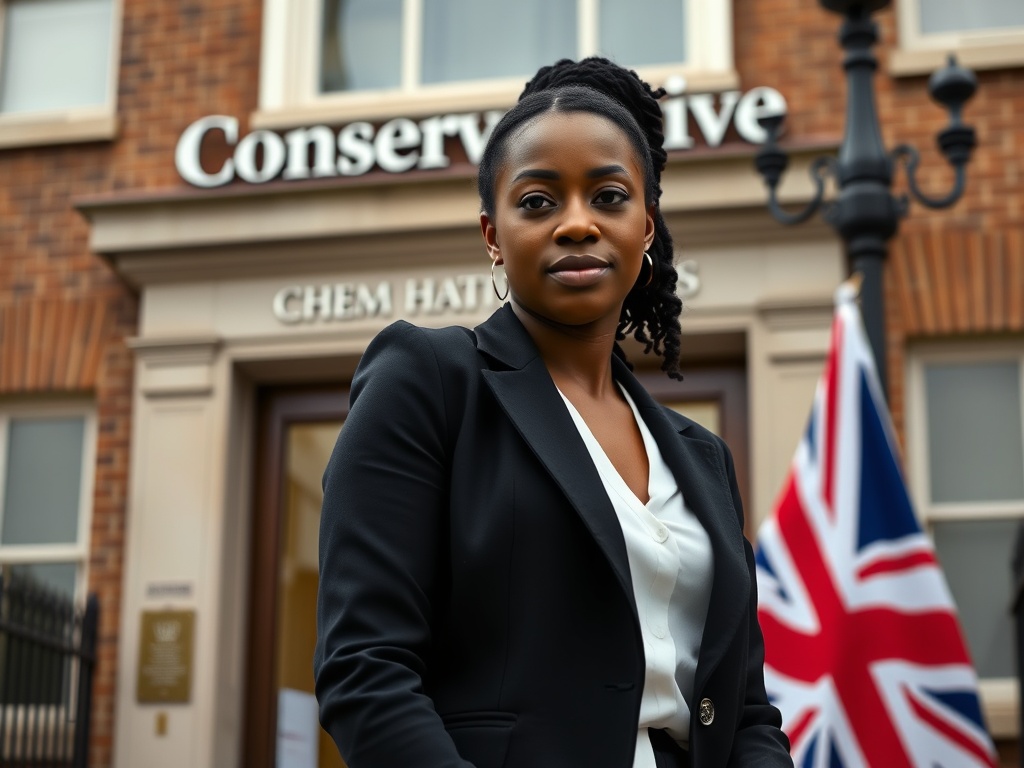The Struggles of the Conservative Party in Today’s Political Landscape

There’s a mantra that many competitive parents instill in their children: “There is no such thing as second place. You either come in first, or you’re nothing.” However, in the current climate, most members of the Conservative Party would eagerly seize the opportunity to secure second place. Instead, they often find themselves languishing in third, trailing behind both Nigel Farage’s Reform Party and Keir Starmer’s Labour Party. A recent YouGov poll revealed this troubling trend, placing Reform at 27 points, Labour in second at 25 percent, and the Conservatives lagging with a mere 21 percent. This situation has sparked alarm among aides in Conservative campaign headquarters, with one disgruntled Tory MP declaring, “The situation is not sustainable.”
The leadership of Kemi Badenoch has come under increased scrutiny just over 100 days into her tenure. Even as MPs take a break during the parliamentary recess, discussions are already swirling about what—or who—could reinvigorate their party’s fortunes. Although the next election may still be years away, the Conservatives are increasingly anxious that without decisive action, they could find themselves in the political wilderness.
“There’s a lot of frustration right now that things haven’t changed quickly enough,” admits a member of the Shadow Cabinet. However, a loyalist of Badenoch argues that the expectations set by her colleagues are unrealistic: “It’s not fair to expect rapid improvement. We’re dealing with limited resources, and our number of MPs is small. Meanwhile, Reform is riding high on the wave of Trump’s populism.”
The core message from Badenoch’s supporters is to maintain patience: “Let’s cut her some slack and give her the time she needs,” says one MP. Yet, not all are so forgiving. Some Tory MPs have been sharing a segment from the Popbitch gossip email that claims “disgruntled” aides have been overheard in the watering holes of SW1 complaining that Badenoch “really doesn’t like being asked to do much before lunch.” While her supporters dismiss this as mere gossip, it is perhaps telling that Badenoch’s internal critics have been vocal about the “hard work” displayed by other Shadow Cabinet members. “Rob [Jenrick] is always out and about. His social media presence is active, and he puts in a significant amount of effort,” remarks one MP. “That’s something to be admired.”
Performance Metrics and Future Directions
This month’s ConservativeHome Shadow Cabinet league table reflected these sentiments, suggesting that grassroots members of the party share similar views. The poll ranked Jenrick—who serves as the shadow justice secretary—at the top, followed closely by Mel Stride in second place. In contrast, Badenoch, who had consistently led in previous polls since the election, has now dropped to 14th place. “The ranking primarily mirrors how hard each member is working,” observes a party figure.
So, what steps can Badenoch take to turn the tide? Within Tory gossip circles, there has been chatter about potential successors ranging from Boris Johnson to James Cleverly and Jenrick. However, the prevailing mood within the party is not one of regicide. Instead, most MPs are merely seeking to see a bit more urgency from their leadership: “We keep hearing that we need to be patient. Yet, there’s a strong case to be made for being more proactive instead of allowing Nigel [Farage] to dominate the airwaves.”
Within the Shadow Cabinet, plans are underway to build momentum. Inspired by her Conservative counterparts abroad, such as Pierre Poilievre in Canada, Badenoch has begun engaging in more long-form podcast interviews. The belief is that an extended discussion on her beliefs will showcase her strengths better than the conventional “gotcha” journalism prevalent in shorter interviews. However, this strategy is not viewed as a standalone communications plan. “Kemi enjoys doing podcasts, and she excels in them, which helps shape opinion pieces. But the real challenge lies in reaching out to the average voter,” comments a shadow minister.
To address this, there are plans to increase Badenoch’s visibility across the UK in the coming months. The much-anticipated policy commissions are also in the pipeline, with each Shadow Cabinet member expected to lead one. The aim is to have these initiatives in the launch phase by Easter, with shadow Home Secretary Chris Philp likely heading the most discussed commission. Within Tory ranks, there is growing pressure to distance from the European Convention on Human Rights as a countermeasure against Farage.
The rise of Reform has sparked conversations among Tories about a possible electoral pact. While Farage has dismissed this idea, many believe that some form of agreement could be feasible—though it’s widely assumed that Badenoch would never entertain such a deal. It’s imperative for her to demonstrate a clear path towards revitalizing the party’s standing in the polls and to effectively challenge Labour on her terms. Failing to do so will only fuel her critics’ calls for a partnership or merger, regardless of her personal reservations.
Though Badenoch may draw inspiration from Poilievre, an unexpected source of optimism could arise from a challenge facing the Canadian Conservative leader. After maintaining a significant lead for an extended period, the polls have begun to tighten as the election approaches, with Trudeau’s governing party closing in, despite its recent troubles. This scenario highlights the volatility of polling, especially over a prolonged timeframe. It’s a crucial message that Badenoch must communicate to her party before they descend into full-blown panic mode.
Katy Balls is the political editor at The Spectator.




